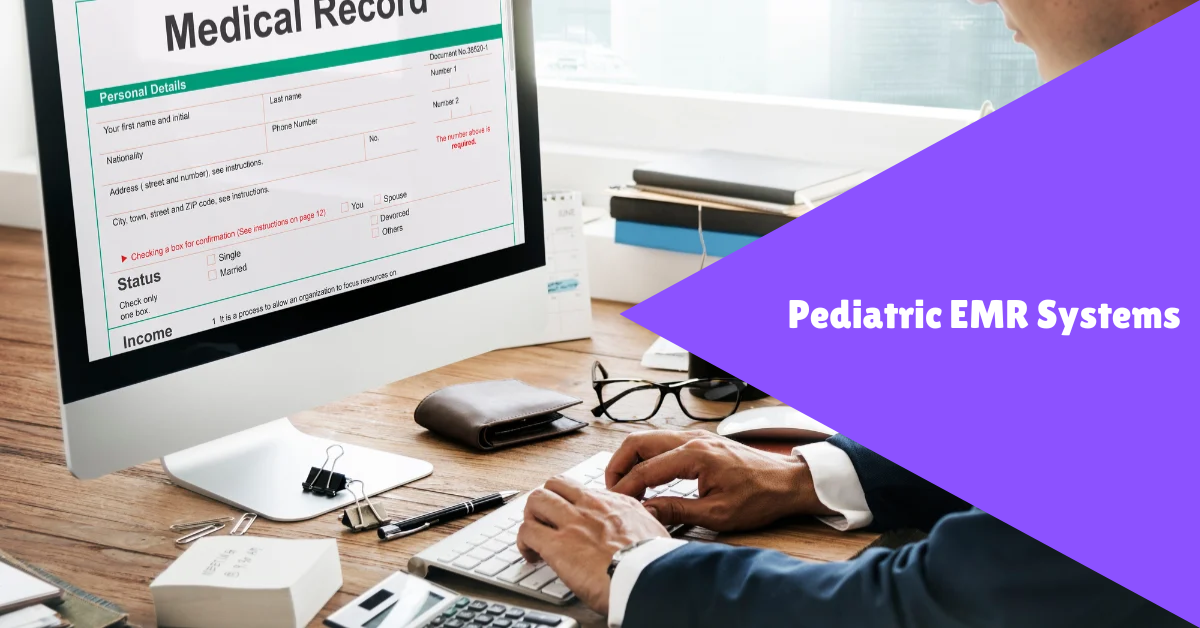In modern pediatric care, pediatric EMR systems (Electronic Medical Record systems) have become vital for managing a child’s health information effectively. Unlike general EMRs, pediatric EMR systems are specifically designed to handle the unique medical needs, growth patterns, and immunization schedules of children, from newborns to teenagers.
With the growing demand for digital healthcare solutions in India, pediatric EMR systems are proving to be a game-changer for doctors, clinics, and hospitals looking to provide accurate, efficient, and child-friendly care.
What Are Pediatric EMR Systems?
Pediatric EMR systems are specialized electronic medical record software tailored to support pediatricians and child specialists. These systems help track and manage medical data related to a child’s development, vaccinations, growth metrics, allergies, prescriptions, and medical history.
Unlike general EMR platforms, pediatric EMRs include features like:
- Growth charts based on WHO and IAP standards
- Vaccine schedules with reminders
- Weight, height, and head circumference tracking
- Pediatric dosage calculators
- Neonatal screening and developmental milestone tracking
These tools ensure that pediatricians provide personalized care based on a child’s age, weight, and health status.
Key Features of Pediatric EMR Systems
Here are some must-have features that make pediatric EMR systems suitable for child care:
1. Age-Specific Growth Charts
Visual growth tracking charts based on the Indian Academy of Pediatrics (IAP) or World Health Organization (WHO) guidelines to monitor development accurately.
2. Immunization Management
Built-in vaccination schedules for all age groups, with reminders for upcoming shots and alerts for missed doses.
3. Parental Access Portals
Allow parents to access their child’s records, book appointments, view prescriptions, and receive notifications.
4. Pediatric Medication Tools
Dosage calculators that adjust based on a child’s weight and age to ensure safe prescriptions.
5. Neonatal and Infant Care Modules
Support for newborn health records, including APGAR scores, birth details, and early screening results.
6. Developmental Milestone Tracking
Monitor if a child is meeting physical, emotional, and cognitive milestones at each stage of life.
7. Data Security and Compliance
Secure handling of sensitive pediatric data with adherence to healthcare data regulations in India.
Why Pediatric EMR Systems Are Crucial in India?
India’s pediatric population is vast and diverse. Doctors often deal with a high volume of patients and limited time for each consultation. Pediatric EMR systems help improve:
- Accuracy: Automated vaccine and milestone tracking reduces errors.
- Efficiency: Faster documentation and streamlined follow-ups.
- Parent Communication: Easy sharing of health records with families via email or mobile apps.
- Continuity of Care: Especially valuable in tier-2 and tier-3 cities where patients may visit different doctors.
Additionally, Indian healthcare is increasingly moving toward digital adoption under initiatives like the Ayushman Bharat Digital Mission (ABDM). Pediatric EMRs align well with these goals.
Benefits of Pediatric EMR Systems for Clinics and Hospitals
Implementing pediatric EMR systems offers several benefits for healthcare providers:
1. Improved Patient Care
By having complete medical records, pediatricians can make better decisions for diagnosis and treatment.
2. Streamlined Documentation
Quick entry of symptoms, notes, and prescriptions reduces paperwork and improves consultation time.
3. Better Vaccine Compliance
Automated reminders ensure timely immunizations, reducing disease risk.
4. Enhanced Clinic Workflow
Staff can manage appointments, prescriptions, and follow-ups more efficiently.
5. Custom Reporting
Generate reports for school health checks, immunization audits, and growth tracking.
6. Remote Consultations
Some pediatric EMR systems include telemedicine support, allowing doctors to consult parents virtually.
Choosing the Right Pediatric EMR System in India
When selecting pediatric EMR systems, Indian pediatricians should consider the following:
- Local Standards Compliance (IAP guidelines, NDHM standards)
- Multilingual Support for Diverse Patient Populations
- Mobile Accessibility for on-the-go consultations
- Integration with Diagnostic Labs and Pharmacies
- Custom Templates for common pediatric conditions (fever, asthma, infections, etc.)
- Customer Support and Training
The Future of Pediatric EMR Systems in India
As India’s healthcare ecosystem becomes more digitized, pediatric EMR systems will play a larger role. With more children receiving care in digital clinics, we can expect:
- AI-powered alerts for developmental delays
- Nationwide vaccine tracking via Health IDs
- Cross-platform data sharing between schools, hospitals, and parents
- Integration with wearable health devices for real-time updates
This progress will lead to early detection of childhood disorders, better vaccination coverage, and higher parental engagement.
Conclusion
Pediatric EMR systems are transforming how child healthcare is delivered. With features tailored to children’s unique needs, these systems improve the quality of care, reduce errors, and make health management easier for both doctors and parents.
As India continues to embrace digital healthcare, pediatric EMR systems will become essential tools for every parent. If you have a single or more than one child, now is the time to consider implementing a system that supports better outcomes for your young patients.
KidsCur is a parenting app where you can track your children’s information anytime digitally. To know more about KidsCur, check out this link!
FAQs
FAQ 1: What are pediatric EMR systems?
Answer:
Pediatric EMR systems are electronic medical record software designed specifically for managing children’s healthcare data. They include features like growth charts, vaccination schedules, developmental milestone tracking, and pediatric dosage calculators to support safe and personalized care for children.
Q 2: How do pediatric EMR systems benefit doctors and clinics?
Answer:
Pediatric EMR systems help doctors and clinics by automating tasks such as vaccine tracking, documentation, and growth monitoring. They improve accuracy, reduce paperwork, and save time during consultations, allowing healthcare providers to deliver better, more efficient child-focused care.
Q 3: Are pediatric EMR systems suitable for Indian pediatric practices?
Answer:
Yes, many pediatric EMR systems are designed to meet the needs of Indian pediatricians. They support IAP growth charts, local immunization schedules, multilingual interfaces, and compliance with India’s digital health mission, making them ideal for both urban and rural practices.

